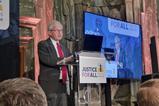‘Severe abuses’ of the arbitral process in a $11bn case involving the Nigerian government raise urgent questions about the role of arbitrators and arbitration itself
Last week’s High Court judgment overturning an $11bn (£9.1bn) arbitration award against the government of Nigeria has been hailed as a historic victory against corruption. But in his 140-page judgment in Federal Republic of Nigeria v Process & Industrial Developments Ltd, the Honourable Mr Justice Robin Knowles raised difficult questions about the role of arbitration in settling high-value disputes involving states, suggesting the process is vulnerable to fraud.
Knowles also criticised the behaviour of two lawyers involved in the award, referring a copy of his judgment to the Solicitors Regulation Authority and the Bar Standards Board.
The ruling, which followed eight weeks of hearings earlier this year, overturned a 2017 award in favour of engineering and project management company Process & Industrial Developments. The award concerned Nigeria’s alleged failure to carry out its side of a 2010 contract to develop gas resources; Nigeria challenged the award under section 68 of the Arbitration Act on the grounds that the contract had been obtained by bribery.
While not accepting all of Nigeria’s allegations, Knowles agreed, saying the company had won its award ‘only by practising the most severe abuses of the arbitral process’.
'The facts and circumstances of this case, which are remarkable but very real, provide an opportunity to consider whether the arbitration process… needs further attention where the value involved is so large and where a state is involved'
Mr Justice Robin Knowles, Federal Republic of Nigeria v Process & Industrial Developments Ltd
The case demonstrated the importance of section 68 in maintaining the rule of law, Knowles said. However, the judge observed that he was ‘acutely conscious of how the outcome could have been different’. He said he hoped the case provokes debate and reflection among the arbitration community.
‘The facts and circumstances of this case, which are remarkable but very real, provide an opportunity to consider whether the arbitration process… needs further attention where the value involved is so large and where a state is involved.’
The risk, Knowles said, is that arbitration becomes less reliable and more vulnerable to fraud, particularly given the privacy of the arbitration process. He warned that ‘a case such as the present could happen again, and not reach the court’.
In an endnote, Knowles lambasted individuals who were ‘driven by greed and prepared to use corruption; giving no thought to what their enrichment would mean in terms of harm for others’. He said he would refer a copy of his judgment to the SRA and BSB in relation to the conduct of solicitor Seamus Andrew and barrister Trevor Burke KC over the handling of documents which came into P&ID’s hands during the arbitration proceedings.
‘As legal professionals Mr Andrew and Mr Burke KC appreciated that [Nigeria’s internal legal documents] included documents that were privileged,’ the judge said.
Knowles rejected as ‘untrue’ Andrew’s oral evidence that the documents were shared as part of settlement discussions: ‘Mr Andrew and Mr Burke KC knew that P&ID and they were not entitled to see these documents. Their decision not to put a stop to it, at least by informing Nigeria or immediately returning the documents they knew were received, was indefensible.
‘The reason Mr Andrew and Mr Burke KC behaved in this way was because of the money they hoped to make,’ Knowles added. Andrew may have had a claim for up to £3bn in the event of P&ID’s success while Burke may have had a claim for up to £850m, the judge said. ‘I trust that these two regulators of the legal profession in England & Wales will consider the professional consequences of the conduct of Mr Burke KC and Mr Andrew in relation to Nigeria’s internal legal documents.’
In statements Andrew and Burke denied any wrongdoing. Andrew said: ‘I do not accept the criticism in the judgment concerning Nigeria’s internal legal documents. I believe I acted in accordance with my professional duties, and I am confident that my conduct will in due course be vindicated by my regulator.’
Burke said: ‘I do not accept the criticisms that have been made of me in relation to Nigeria’s internal legal documents. I gave my evidence in the English proceedings in good faith and to the best of my ability. I am confident that my conduct will be exonerated by my professional body with whom I shall cooperate fully.’
Shaistah Akhtar, a partner at London firm Mishcon de Reya who led Nigeria’s legal team, said Knowles’ judgment was a ‘historic result for Nigeria and its people’. She added: ‘We trust that this landmark decision will deter other potential fraudsters and their backers from exploiting the legal system in the pursuit of monetary gain.’
A spokesperson for P&ID’s lawyers, international firm Quinn Emanuel, said: ‘Whilst P&ID fully respects the judgment of the English court, it is of course disappointed with the outcome.
‘P&ID is considering the steps available to it in the light of the judgment; the proceedings are ongoing and it would not be appropriate to comment further at this stage.’





































1 Reader's comment